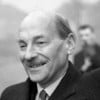The Religious Society of Friends
- L. Andrew Marrposted 15 years ago
0
Hello,
This is not one of those hubs trying to cause religious debate or argument.
All I want to know is if anyone can tell me more about 'The Religious Society of Friends' or, by their other name, 'Quakers'?
Luke.George Fox of England 1700's
Hey you can find all you want to know on the web.
- L. Andrew Marrposted 15 years ago
0
Yeah, I've been searching around and looking - but I can't seem to contact a real life Quaker - only see what they apparently say. I figured here was a good place to find out from a real Quaker what it is like being one.
- philip carey 61posted 15 years ago
0
The Friends are prevalent where I live in Pennsylvania I know many of them, and they are pretty ordinary people for the most part. The tend to be liberal, educated, and non violent. There are even Buddhist leaning Quakers. Google it, and you'll find plenty.
OK first off, apollogies for the length of this post, but you ask a question for which a simple, "Yeah Quakers are great" kind of answer just doesn't suffice. With that said I hope you, or anyone else reading this for that matter, gains something valuable from it.
The Quakers were started over 350 years ago in an area of North West England now referred to as "1652 country" by a Christian prophet named George Fox. At the time, various Christian sects sprang up as a part of the Reformation and Quakerism (as it would later be know colloquially) was one of the largest.
It was a puritan sect of rejection-ists who valued personal experience of the divine above all else. All religious edifice (both physically and spiritually) was stripped away. Icons, clergy, hierarchy, even baptism and creeds were completely done away with. The early Quakers believed that the example of Christ's simple and direct communion with God showed a way to live authentically without the need to adhere to the governance and edicts of both the Church and society in general. As a result many early Quakers refused to take part in wars, pay taxes and tithes, swear on the bible, show deference to anyone as being superior, or treat each other as unequal.
Consequently Quakers have a long history of religious (or at least christian) firsts. They were the first to allow women ministers (from the start all Quakers were ministers), the first to support the abolition of slavery (even though many Quakers owned and even traded slaves), the first to gain the right to sanctify their own non-christian marriage ceremony, the first to be allowed to present evidence in a court of law without taking an oath, the first to completely reject violence as an official stance, and just recently the first to allow same sex marriage as an equal and religious act. And many other firsts too numerous to list.
Today we might look back on the early Quakers and their radical puritanism as being ultra conservative and perhaps think of that as a form of inward-looking resistance to change or the outer world at large, but at the time of the early church it was radical and different. The Quakers are and always were a very progressive and adaptable society. They have been at the forefront of some of the most important issues our world has faced for over 300 years. As the Society has progressed through the years, without a creed or set of canonical scripts, it has both changed with the times and kept true to the spirit of its founders.
In the place of a creed, the Quakers have a set of "testimonies" that they have held to as centrally guiding principles; Equality, Simplicity, Peace (or non-violence), and Integrity. These principles guide every decision that is made by the Society (decisions which are arrived at mutually by the entirety of the congregation), and as the times and people around them change, rather than withdrawing and distancing themselves from society, the Quakers embrace their shared experience within society and adapt their perspectives and lifestyles to adhere with their principles from within modern life. This adaptability is most evident in the way the primary belief system has changed from Christianity at its inception to a universal mix of nearly all religious view points (even including atheism - though very rarely).
As a Quaker I am very proud of the way our church has grown and changed through the years, and how influential it has been even in the face of very great adversity (early Quakers were horribly persecuted, tortured and even put to death). Of course the Society is far from perfect, being a collection of mere human beings as it is, but it is one of the few religious societies in the world that actually acknowledges its own humanity (and human error), whilst striving to be divine.
My mentor, Joseph Campbell, once said that any good religion will not just lead you up to the feet of the metaphor but will allow you once there to go beyond. For that reason he claimed Catholicism was a failed religion. I don't know if I agree with him, but I certainly don't feel that Quakerism in any way limits my viewpoint of the Christian metaphor. As we sit in silent worship, waiting for "the spirit of 'God'" to move us to speak or feel or contemplate some thing profound, I always take note how the only guide at that point is my own experience. And when (if) someone does speak it unfailingly gives me pause to contemplate something greater than I could ever merely think of. There is a shared "being" about the presence of a room full of people, sitting quietly, expectantly, like-mindedly contemplating the divinity of and in each other. Or even what the "divinity" may be.
Of course, most of this is simply my experience and interpretation. One thing to know about Quakers is that there are about as many ideas of what Quakerism is as there are Quakers. And unlike some religious organisations, that is considered to be a good thing in the Religious Society of Friends. There are some really good resources online though, as some of the other posters pointed out.
Take a look at the Watford Meeting House videos on YouTube for example.
[url=http://www.youtube.com/watch?v=-XlMkK4_kTg&feature=related]And the excellent Jon Watts
Or have a read through the Advices and Queries on-line (A&Q is the closest thing we have to a Quaker ten commandments, although there are no commands and as a fundamentally Christian organisation the actual Ten Commandments often suffice).
Lastly, Quaker.org.uk is the website of the Religious Society of Friends in Britain and has many, many resource within it.
One final point, as the Quakers spread across the globe, history and distance has altered the gene of the Quaker tradition. While the testimonies and principles are much the same from one area to the next, many groups of Quakers have developed different ways of expressing their Quakerism. Some are staunchly resistant to change and prefer to protect the original ideas and ideals of the 17th century Friends, others are progressive yet reserved (like the British Quakers), while others still are more flamboyant and evangelical. There are shades in between as well and though they are vastly different at the poles, the roots of our family tree are the same.
I hope this has helped some.Famous Quakers: Susan B. Anthony, Richard Nixon, Daniel Boone, Annie Oakley, and my dad's favorite poet - John Greenleaf Whittier.
And here's somewhat of a shocker for ya: James Dean was a Quaker. Yep! The Rebel Without a Cause guy!after reading the post above I am not too surprised at James Dean as one of the rebellious ones!

Great post, JR Ryan - I am originally from the North West of England and have always had a lot of time for the Quakers. I have met many and respect their open-mindedness, tolerance and pacifism.
You should develop the post into your first Hub - I would love to read more
And Hey Sufi....... Don't forget Quaker Oats

The very reason Richard Nixon didn't burn the Watergate tapes.. (He was busy eating his oats in true Quaker tradition)
Someone once described him as: A Regular Guy!
Related Discussions
- 40
Do you think the Ten (10) commandments are really no longer useful?
by Minister Mitch 10 years ago
Do you think the Ten (10) commandments are really no longer useful?What will happen if the 10 commandments are no longer taught in the homes of Americans?.
- 44
Is religious shunning a form of mental and emotional abuse?
by Athlyn Green 12 years ago
Is religious shunning a form of mental and emotional abuse?Some religions, under the guise of keeping the flock pure, shun members who leave the faith. Is this a form of psychological abuse that should it be permitted in society?
- 25
Where are the Christian Principles?
by cjhunsinger 11 years ago
Where are the Christian Principles?It is widely held that America was Founded upon Christian Principles, but what exactly are those principles? It is also agreed that the Founding Principles of the US are found in The Bill of Rights. In reading, again, those Rights I find done that reflect any...
- 49
Do you think the Founding Fathers intended a Christian Nation?
by MPChris 12 years ago
Do you think the Founding Fathers intended a Christian Nation?This question is in specific reference to two important pieces of legislative evidence. Both, the 1st Amendment and the Treaty of Tripoli (Article 11). Keep in mind that the Treaty was ratified by many of the original founding fathers,...
- 110
Where did people get the idea that religious people are judgements?
by Jack Lee 8 years ago
In discussion here on hubpages, we hear some accuses religion people of being judgemental and more over accuses religious people of forcing their believes and policies on the American people through laws...That is not the religion or people I know. Where is this disconnect coming from?Could it be...
- 81
Are Christian Nations better or worse than Non-Christian Nations?
by aoiffe379 15 years ago
During a program that allowed comments from people on the street, one individual was asked what can be done to stop crime. The response was to accept Jesus Christ as Lord and be baptized. An individual who was viewing the program with me regarded the answer as stupid and declared that nations that...












